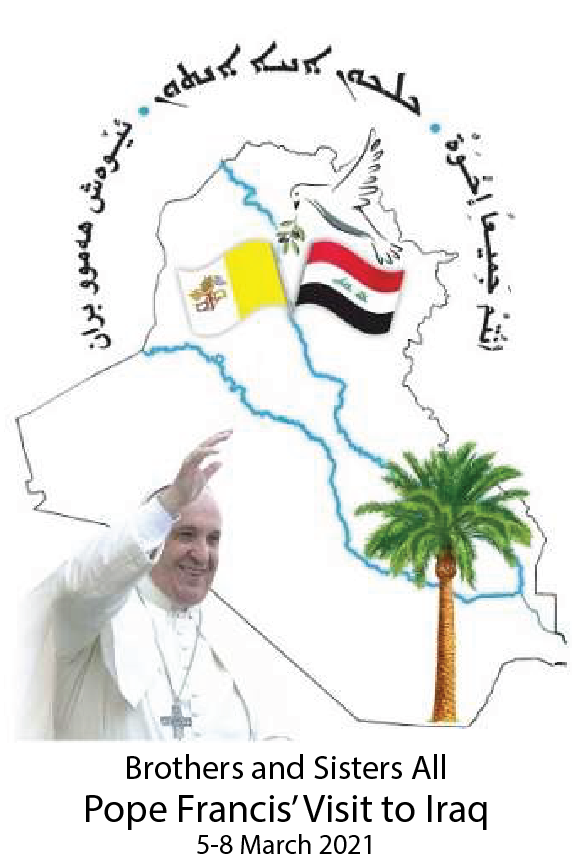Papal Journey to Iraq Holds Promise, Challenge, Hope

It is difficult to exaggerate the importance of Pope Francis’ visit to Iraq, planned for March 5-8, 2021.
A prayer composed for the occasion asks for blessings on Pope Francis’ efforts to promote dialogue, reconciliation, peace, and human dignity.
To this end, during the 3-day journey visits are scheduled for Pope Francis with governmental leaders and other authorities in civil society. The pope will be present to the Christian community for events in Baghdad and Mosul as well as Erbil and Qaraqosh—beloved home of many Iraqi Dominican sisters and brothers, religious, ordained and lay. And—quite remarkably—he plans a private visit with 90-year-old Grand Ayatollah al-Sistani, the most powerful Shia cleric in the world, in Shia Islam’s pilgrimage city, Najaf.
There will also be a pilgrimage to Our Lady of Deliverance, the Syriac Catholic cathedral in Baghdad where, in 2010, 58 people died and 78 were wounded in an attack by jihadist militants associates with the Islamic State of Iraq.
Dominicans and others in the Christian remnant in Iraq are overjoyed, if cautious, about the papal visit. They see the trip as a sign of hope after decades of war, genocidal persecution, economic deprivation, and disease.
In recent interviews with National Catholic Reporter two Iraqi Dominican Friars expressed their desires for the papal visit. Baghdad-based Dominican Father Rami Simon said “Iraq and the Christians of Iraq have been waiting for this visit for many years. It gives hope for all Iraqis and especially Christians that things will get better in the country, despite the big challenges that we face.”
In Erbil, Father Majid Makdisi expressed both hope and apprehension. Though fearful for the pope’s physical safety and health in the midst of pandemic, Father Majid said “With the hard times we are living in now there is a message of solidarity, brotherhood and love. He tries to be close to everyone. He is the pope of the poor.”
If allowed to go forward, this will be the pontiff’s first international trip in 16 months and the first-ever visit of a pope to Iraq.
Bishop Yousif Thomas Mirkis, our Dominican brother and head of the church in Sulaymaniyah, wrote a lengthy formal welcome for the pontiff. In English translation he says “Welcome, Francis, to our region, to encourage those who struggle against the ‘culture of speed and urgency.’ We, like you, believe that ‘the measure of the greatness of society appears through the way in which the people who are most in need, and who have nothing but their poverty, are treated!’”
Many millions of Iraqi nationals have also fled Iraq and are now citizens, asylees, and refugees around the world. The Iraqi diaspora will be keenly interested in the visit.
Cardinal Louis Raphael Sako, patriarch of the worldwide Chaldean Catholic Church, sees this displacement as a great challenge to the well-being of the Iraqi church. Because the presence of Christians in the Middle East is threatened, the cardinal said, it would give Christian Iraq “great hope to hear [the pope’s] speeches and his encouragement to remain in our land.”
Pope Francis first mentioned publicly his desire to visit Iraq in June of 2019. Then he said he hoped that Iraq could “face the future through the peaceful and shared pursuit of the common good on the part of all elements of society, including the religious, and not fall back into hostilities sparked by the simmering conflicts of the regional powers.”
According to the Worldometer COVID tracker February saw an increase in new cases. The Iraqi government announced a strict lockdown in mid-February, including the closure of mosques and churches until further notice. The papal trip could still be postponed but as of February 22 was on the schedule.
The International Crisis Group, an independent organization that seeks to prevent war and create a more peaceful world, notes the challenges facing Iraq, including the consequences of decades of war, crippling sanctions and the ravages caused by the transnational jihadists of Islamic State after 2014. Iraq is also challenged by sectarian violence and Kurdish separatism. Problems can be addressed with better governance and efforts to mitigate the impact of foreign strategic competition, notably between Iran and the U.S, the group believes. Other issues to be addressed include territorial disputes with Iraqi Kurdistan and the issue of oil revenue-sharing.
The Dominican Family in the United States has stood in solidarity wit their sisters and brothers in Iraq since 1999 when the first group of U.S. Dominicans visited Iraq in response to a plea from the Dominican Sisters while the country was suffering the impact of nine years of UN-imposed economic sanctions. “We feel as if even God has forgotten us” the Sisters told then-Master General of the Order, Timothy Radcliffe. In an effort to express solidarity and concern U.S. Dominicans have made multiple visits to Iraq in small delegations. The last trip was in 2018.
Beth Murphy, OP Feb. 24, 2021
Important Links:
 USA
USA


